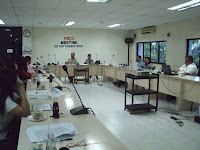With Christmas just around the corner, the Department of Trade and Industry (DTI) reminds consumers to only buy Christmas lights that bear the Import Commodity Clearance (ICC) mark to ensure a hazard-free holiday festivity.
DTI Secretary Gregory L. Domingo states, “DTI alerts the public to be vigilant and extra cautious in choosing the Christmas lights they buy and adorn in their homes so as not to put the lives of their loved ones in danger.”
”Only those sets of Christmas lights with the ICC mark sticker have passed DTI’s mandatory safety tests, thus these products are safe and reliable to use,” stresses Secretary Domingo.
DTI Secretary Gregory L. Domingo states, “DTI alerts the public to be vigilant and extra cautious in choosing the Christmas lights they buy and adorn in their homes so as not to put the lives of their loved ones in danger.”
”Only those sets of Christmas lights with the ICC mark sticker have passed DTI’s mandatory safety tests, thus these products are safe and reliable to use,” stresses Secretary Domingo.
DTI regulates the sale of Christmas lights in the local market to protect consumers from the hazards posed by substandard products such as electric shock and overheating that often lead to fire, property damages and even loss of lives.
Under the DTI-Bureau of Product Standards (BPS) Product Certification Scheme that is based on the Department Administrative Order 05:2008, all importers of Christmas lights shall secure an ICC certificate prior to the sale and distribution of their products in the local market. Only those whose products have successfully complied with the requirements based on the Philippines National Standard on Christmas lights (PNS 189:2000) are appropriately issued with the ICC Certificate and are allowed to affix the ICC stickers on their products or product packages.
Secretary Domingo emphasizes, “The ICC mark is in sticker form and comes with a unique serial number. Those sets of Christmas lights with pre-printed ICC mark on its package are definitely uncertified and did not undergo proper tests and inspections of the Department.”
Under the DTI-Bureau of Product Standards (BPS) Product Certification Scheme that is based on the Department Administrative Order 05:2008, all importers of Christmas lights shall secure an ICC certificate prior to the sale and distribution of their products in the local market. Only those whose products have successfully complied with the requirements based on the Philippines National Standard on Christmas lights (PNS 189:2000) are appropriately issued with the ICC Certificate and are allowed to affix the ICC stickers on their products or product packages.
Secretary Domingo emphasizes, “The ICC mark is in sticker form and comes with a unique serial number. Those sets of Christmas lights with pre-printed ICC mark on its package are definitely uncertified and did not undergo proper tests and inspections of the Department.”
DTI Consumer Welfare Undersecretary Zenaida Maglaya explained, “Other import labels that consumers should check on the package of Christmas lights are the manufacturer’s / supplier’s / distributor’s name, address and trademark or brand, rated voltage and rated wattage of the set; rated voltage and rated wattage of the lamp; the words,”For indoor use only”; the number of this standard (PNS 189:2000); and the batch/ lot number or bar code.
Undersecretary Maglaya added that to further guide consumers on the proper use of the product, each set of Christmas lights should have suitable warning such as, “do not cascade / attach more than three (3) sets of Christmas lights to avoid overloading”, “disconnect from supply before removing or inserting any lamp”, “avoid damage to wire”, “busted lamps must be replaced immediately by lamps of the same rated voltage and wattage to avoid risk of overheating”, and “never leave plugged-on lights overnight or unattended.”
Undersecretary Maglaya added that to further guide consumers on the proper use of the product, each set of Christmas lights should have suitable warning such as, “do not cascade / attach more than three (3) sets of Christmas lights to avoid overloading”, “disconnect from supply before removing or inserting any lamp”, “avoid damage to wire”, “busted lamps must be replaced immediately by lamps of the same rated voltage and wattage to avoid risk of overheating”, and “never leave plugged-on lights overnight or unattended.”
Secretary Domingo underscores, “the proper use of the product is very important to ensure that it performs as expected. Thus, consumers are urged to carefully read the instructions before installing the product to prevent untoward incidents.”
The DTI reminds consumers to buy only the following brands of Christmas lights that have passed the required safety tests of DTI:
COMPANY | BRAND |
Andalucia Trading Co., Inc. | Price Mart |
Filjie Trading International | Lucky Star |
Golden Hit Corporation | Golden Seasons / Twinkle Star |
Golden Seasons Corporation | Golden Seasons / Twinkle Star |
Great Home Makers Enterprises | Lights & Shine / Joy of Lights / |
Ikhea Lighting, Inc. | ET / GHC |
Landlite Philippines Corporation | Landlite |
Main Stream General Merchandise | MLA / Luck Deer |
Mighty Armour Enterprises | Star |
New | North Star |
P&J Multitrade Venture, Inc. | Andrews |
Pacific Arrow Enterprises | Good / 7 Star |
Pinecrest Enterprises | Goldcrest / Pinecrest |
Sheratone Enterprises | Fuji Bright & Fuji-lite |
Shining East Marketing Corp. | Yuletide Fantasy / The Magic of Lights / Seasons of Lights / Super Bright / The Joy of Lights / Lights & Shine / |
Wan Dan Xin Trading Int’l, Inc. | Mabuhay Star |
Wexford International Sales, Inc. | Diamond Bright |
Xing Long Import Enterprises | Rainbow |
Consumers may report stores selling Christmas lights without ICC marks to DTI Direct 7510-3330 or to the nearest DTI Regional and Provincial Office. For more information on Christmas lights www.bps.dti.gov.ph.
For more news on DTI please visit http://tradeneconomydti.blogspot.com/ http://tradeneconomydtiact.blogspot.com/

